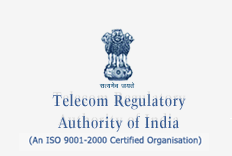 I have earlier discussed two issues pertaining to Spectrum pricing. First one was about fixing price of 1800 MHz band spectrum at par with current 3G spectrum price and the other topic discussed fixing the price of 900 MHz band spectrum, which is quoted as 1.5 times of 1800 MHz band spectrum price. Now we will continue the discussion over fixing price of spectrum allocated beyond stipulated limits of 6.2/5 MHz for GSM/CDMA.
I have earlier discussed two issues pertaining to Spectrum pricing. First one was about fixing price of 1800 MHz band spectrum at par with current 3G spectrum price and the other topic discussed fixing the price of 900 MHz band spectrum, which is quoted as 1.5 times of 1800 MHz band spectrum price. Now we will continue the discussion over fixing price of spectrum allocated beyond stipulated limits of 6.2/5 MHz for GSM/CDMA.
The issue arises because in some circles telcos were assigned spectrum upto 12.4 MHz which is quite higher than stipulated allocation. TRAI has stated the same in clause 2.47:
The Authority is clearly of the view that the contracted spectrum for all the access licences issued in or after 2001, is6.2MHz / 5 MHz in respect of GSM/CDMA respectively.
The entire discussion has been carried out in earlier paras on how TRAI has reached to stipulated figure of 6.2/5 MHz. Where in 2001 Tender document, the basic allocated spectrum was 4.4 MHz, government itself awarded 6.2 MHz spectrum to 3rd & 4th licensee, without any justification. Earlier justification states that spectrum beyond 4.4 MHz sould be assigned on the basis of proper spectrum utilizations. This clearly indicates to subscriber linked criteria of spectrum allocation. But then 3rd & 4th licensee were awarded more spectrum without taking earlier tender document into account. This simply points toward the fact that TRAI’s policy of allocating spectrum itself is inconsistent and telcos shouldn’t be held responsible for that.
Moreover government’s affidavit filed in 2007 states the same fact that spectrum allocated beyond 4.4 MHz to 6.2 MHz would be on the basis of maximum utilization of earlier allocated spectrum. The same affidavit also states that spectrum beyond 6.2 MHz would be assigned in chunk of 1 MHz. So it clearly implies that the allocated spectrum beyond 6.2 MHz is based on TRAI’s policies. But then there’s no mention of any charges for allocating the spectrum beyond 4.4 MHz. How are they charged? Were they allocated spectrum free of cost?
Actually if you look at clause 2.47, which also mentions more about tender document published in 2001, telcos were charged one time entry fee after successful bidding for the basic spectrum allocated. Then there are additional charges like license fee and spectrum usage charges. But then the spectrum allocated beyond 4.4 MHz was assigned on the basis of spectrum usage & maximum utilization. This is a false logic, which is now scrapped by TRAI. Though operators paid license fee and spectrum usage charge for that, if you look at closely, they are entitled to one time fee for additional spectrum. Certainly countries natural resource can’t be allocate free of cost to earn revenues.
Why now? In para 2.44, clause III, government has made it clear that it has right to modify and amend the procedure for allocating spectrum at any time without assigning the reason. This has been made clear in report submitted in May 2009. So I feel government has rights to reframe the entire spectrum allocation procedure in tune with current market conditions.
What should operators do now? They might be feeling sunken into more and more pricing constraints. But when TRAI has scrapped subscriber linked criteria to allocate spectrum, entire allocation beyond 4.4 MHz should be reviewed. Though operators feel that they were given spectrum as per policy, they can’t justify the allocation of spectrum beyond 4.4 MHz virtually free of cost. What policy they are referring to? The policy they are referring to has been scrapped and there’s no consistency over allocation of spectrum earlier. In fact there’s no consistent policy document over allocation of spectrum. This lead to unfair spectrum advantage to few players and rest were deprived of country’s most valuable resource. Telecom is not a level playing field if you stick to earlier policy documents. And these few players earned crores of revenue based on unfair allocation.
But then as stated in my earlier article, pricing 2G spectrum at par with 3G auction price isn’t the way out of this mess. While TRAI is only looking at repairing the lost revenue to exchequer, few telcos received unfair advantage over others due to such policy. Now when TRAI wants to make it level playing field for all without loss of revenue, then only way should be to take back the extra allocated spectrum, which would lead to loss of services to subscribers. The only way out to this mess is stated in 3.99:
Accordingly, the Authority recommends that all the serviceproviders having spectrum beyond the contracted quantum should pay excess spectrum charges at the Current price,pro-rated for the period of the remaining validity of theirlicence subject to a minimum of seven years. Serviceproviders returning the excess spectrum shall be liable toreturn the 900 MHz spectrum if any and also pay theadditional one-time charges at the Current price for aminimum period of three years.
Why this solution (with little modification) appears to be right?
- Operators who were holding excess spectrum would only be charged for remaining balance life of license and not for entire period, since they received the spectrum.
- Government will lose some amount as licensee would be charged for spectrum now onwards upto the expiry of license, they would be getting one time entry fee for balance life of spectrum.
- Moreover subscriber services wouldn’t be affected.
But should they be charged at current 3G market price of spectrum?
I feel more suitable way would be to stick to finding ratio of growth in Adjusted Gross Revenue per MHz of spectrum, which comes out to be 4.99 times to 1659 Cr INR entry fee price, for balance life of license (based on revenue calculations Clause 3.77). Don’t bring 3G prices into picture. By this method telcos would have to pay 8000 Cr INR, instead of 16000 Cr INR, which leads to 50{af589cdba9d77786c8c861317dbad60bba1e2ebbf56e2ffab874a1b59fde9ce3} savings on their part.
This solution is win-win deal. TRAI would get one time entry fee, operators could justify their allocated spectrum fee (earlier allocated free of cost) and subscriber services wouldn’t be affected. And for rest of the newcomers, though spectrum wouldn’t be available for use, they have to remain content with the fact that incumbents were charged duly.



